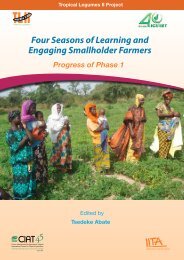Download - icrisat
Download - icrisat
Download - icrisat
You also want an ePaper? Increase the reach of your titles
YUMPU automatically turns print PDFs into web optimized ePapers that Google loves.
81<br />
Enter The Inconvenient Fruit, a different kind of hybrid.<br />
THE INCONVENIENT FRUIT, ITS ORIGIN IS EASTERN.<br />
Belonging to the inconvenient class, fossil fuels are non-renewable; so, making them the major energy source for<br />
cars should not have been the case in the first place. Those gas-guzzling-and-therefore-gas-emitting cars have<br />
become the antithesis of man’s civilized progress.<br />
We need to completely junk fossil fuels in favor of biofuels – that’s an inconvenient truth. Meanwhile, hybrid cars<br />
in many states in the US now use 10% to 90% ethanol to gasoline blends while Brazil now uses 24% (Madhu<br />
Chittora, 2 May 2005, projectsmonitor.com). We do have a choice of source: The Yankee gets his bioenergy from<br />
Zea mays (corn); the Brazilian gets his from Saccharum<br />
officinarum (sugarcane); the Indian gets his from Sorghum bicolor<br />
(sweet sorghum). To each his own species.<br />
As I see it, ICRISAT’s advocacy of<br />
a ‘Grey to Green Revolution’<br />
(William Dar 2007, Nurturing<br />
Life In The Drylands Of Hope,<br />
ICRISAT, Andhra Pradesh, India,<br />
in CD) is the Institute’s global<br />
mission. So: Growing sweet<br />
sorghum for ethanol production<br />
is implementing a Grey to<br />
Green Revolution towards<br />
achieving a global vision.<br />
Let’s go Indian, choosing the inconvenient fruit. Among those I<br />
call the climate crops, sweet sorghum is relatively unknown<br />
among those species that catch the CO 2<br />
from the air and turn it<br />
into food, feed, fuel, fertilizer for the survival of the species. I<br />
know that to advocate sweet sorghum as the global source of<br />
ethanol for biofuel is to advocate a relatively unknown and largely<br />
unappreciated crop in Asia, Africa and America – to write two<br />
major feature articles on this poor man’s crop may be on my<br />
part an inconvenient froth over an inconvenient fruit. This should<br />
not be the case at all.<br />
Meanwhile, they have gone Indian at the campus of the<br />
International Crops Research Institute for the Semi-Arid Tropics<br />
(ICRISAT) in Andhra Pradesh. They have come up with what I shall<br />
refer to here as the sweet sorghum initiative. For having come<br />
up with the initiative, the concept if not the term, for having led<br />
Team ICRISAT in the rediscovery and nurturing of sweet sorghum as an energy crop, for having successfully marketed<br />
the idea of sweet sorghum ethanol first to the private and government sectors in India, for now boldly propagating<br />
sweet sorghum as the climate crop in Africa and Asia:<br />
Dr William Dar, Director General of ICRISAT in faraway India, Filipino, is My Global Manager of the Year (2006).<br />
Since there is no such award, it has been necessary to invent it. I have 7 reasons choosing Dar as my global<br />
manager because he has chosen:<br />
An Inconvenient Truth

















